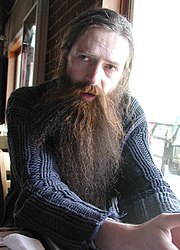 Last night I was walking to a technology event in San Francisco, and being early and thirsty from a reckless run up and down Lombard Street, I found a pub to grab a beer. Though it was dark, I noticed an absolutely impossible not to notice character in the science world, Aubrey De Grey. De Grey has a beard which goes below the waste, making the fact that I wear Mickey Mouse socks and play the banjo look much less eccentric. I have written here before about De Grey, (The Jellyfish)and the philosophical struggle I have, which wavers between a desire to embrace his research to engineer immortality, or to brush it aside as harmful delusion. I introduced myself, and unsurprising he is a major intellect, who enjoys a pint and has an excellent sense of humor. When I told him how much I liked living in Paris, he said something which is insightful, but not usually pointed out which was “why did you like it? Certainly it wasn’t for the beer.” So within 20 minutes I was again thinking that it might be possible to live forever, even though we didn’t even talk about this.
Last night I was walking to a technology event in San Francisco, and being early and thirsty from a reckless run up and down Lombard Street, I found a pub to grab a beer. Though it was dark, I noticed an absolutely impossible not to notice character in the science world, Aubrey De Grey. De Grey has a beard which goes below the waste, making the fact that I wear Mickey Mouse socks and play the banjo look much less eccentric. I have written here before about De Grey, (The Jellyfish)and the philosophical struggle I have, which wavers between a desire to embrace his research to engineer immortality, or to brush it aside as harmful delusion. I introduced myself, and unsurprising he is a major intellect, who enjoys a pint and has an excellent sense of humor. When I told him how much I liked living in Paris, he said something which is insightful, but not usually pointed out which was “why did you like it? Certainly it wasn’t for the beer.” So within 20 minutes I was again thinking that it might be possible to live forever, even though we didn’t even talk about this.The evening was intriguing, mind boggling, encouraging and the food was delicious. This was a group of 200 hundred or so Silicon Valley insiders who were there to talk about a range of foundations that are especially forward thinking, one of which was The SENS Foundation, which De Grey is a founder of. The noble pursuits of the group were on the border of science, economics and possibly science fiction, which is a place I am comfortable inhabiting. With all of the interesting people I talked to, I thought of every conversation through the lens of immortality, as represented by De Grey. Suddenly my reliance on quantitative data became a little less stringent than it usually is amongst scientists. All of the science presented was well researched and intelligent, but many of it exists just beyond the complete technological, or even mathematical grasp of our time. This is important I think. I write about feeling on the fringe of science and music, and the respect I have for the fringe. What I realized from this event is that some of the most successful and smart thinkers and entrepreneurs in the country are not so much on the fringe, but off of the table completely. In this frame of mind a singularity, nanobots and even living forever are technical challenges, not fantasies. For many of these people the science and technology fills the place in their lives that the combination of science and art fill in mine. So is a garage start-up mentality dedicated to eternal rejuvenation (or super humans, or nano robots) a way of dealing with existential dread, or more simply an act of the curious inventor? Are either of these more noble than the other? If an unexamined life is not worth living, does it mean that the search for immortality is examining life more or less? The film maker Darren Aronofsky made a film I liked very much called “The Fountain”. When asked in an interview why he made this film about the search for the fountain of youth, set in the past, present, and a future in a floating bubble in space, he said that it was to show that at some point, regardless of how long we can live, humans need to come to terms with death. It is perhaps the greatest emotional and intellectual chasm I have; that I believe De Grey and Aronofsky at the same time.


